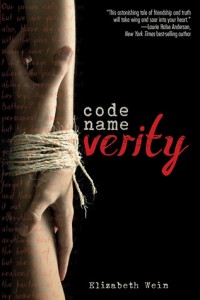This past week was particularly rich in literary-related stories. Here’s a selection chosen for its variety.
Elizabeth Wein’s top 10 dynamic duos in fiction
Some characters just have to exist in pairs: Rosencrantz and Guildenstern, Tweedledum and Tweedledee, Don Quixote and Sancho Panza, Thing 1 and Thing 2.
 Elizabeth Wein’s excellent novel Code Name Verity features a pair of female protagonists who think of themselves as a Sensational Team. In this article Wein introduces us to some of her favorite literary duos:
Elizabeth Wein’s excellent novel Code Name Verity features a pair of female protagonists who think of themselves as a Sensational Team. In this article Wein introduces us to some of her favorite literary duos:
it was hard work narrowing down my teams, so I had to make myself some rules for a fair elimination process. Here’s the system I decided to follow. Each team would have to be a Dynamic Duo rather than a fellowship of three or more (that ruled out the Swallows and the Pevensies), and the pair’s involvement with each other had to further a plot unconnected with any potential romance between them (that ruled out Romeo and Juliet). I also decided that for the purposes of this list each pair of favourites needed to be the main characters in their own stories (that ruled out Fred and George Weasley).
I brainstormed a much longer list than I needed. When I looked it over to choose my top ten, I was amazed and also somewhat disgusted. There wasn’t a single pair of girls on the list. There were more stuffed animals than girls on the list. . . . I feel sure there are other pairs of girls out there besides my own, doing Sensational Literary Teamwork, but they don’t appear in any books I’ve read. Maybe that’s exactly why I make them up.”
Study: Reading novels makes us better thinkers
Discussion continues over whether reading literature somehow makes us better people. This article reports on recent research out of the University of Toronto:
“Exposure to literature,” the researchers write in the Creativity Research Journal, “may offer a (way for people) to become more likely to open their minds.”
In other words, exposure to literature may make people more tolerant of ambiguity, a trait that in turn can help them avoid snap judgments, stereotypical thinking, and bad decisions.
Their results should give people “pause to think about the effect of current cutbacks of education in the arts and humanities,” Djikic and her colleagues add. After all, they note, while success in most fields demands the sort of knowledge gained by reading non-fiction, it also “requires people to become insightful about others and their perspectives.”
Building a Better Book Club
I’m usually skeptical of anyone who begins with a comment something like “I haven’t had this experience myself, but here’s what I think about it.” However, in this case I’ll give the writer, Evan Gottlieb, Associate Professor of English at Oregon State University, a pass. As he explains, since his professional life involves discussing literature with others, he feels he should spend the rest of his time attending to other interests.
Gottlieb may never have attended any book club sessions, but I have: countless book club gatherings over more than 20 years. And I can testify that the seven points he makes here are spot on. I especially like his second point, about keeping the discussion on topic:
2. Plot, character, setting, and style are the four basic formal elements of any novel. . . . As long as you are describing, considering, analyzing, or asking questions about one or more of these elements, you can be sure you are staying focused on the book that everyone (presumably) has read and gathered to discuss.
What do you think of Gottlieb’s advice?
Lady Chatterley’s house goes on sale
The manor house in which DH Lawrence set Lady Chatterley’s Lover is among a number of homes with literary connections currently on the market.
This article discusses several English properties with a literary connection currently for sale. There’s also an interesting discussion about whether a literary connection makes a property more or less valuable.
Even if you can’t afford one of these places, the pictures are lovely.
Dysfunctional Families In Literature
Dysfunctional families in literature run the gamut from amusing to chilling, but they all have one thing in common: they keep the reader glued to the page. After all, as readers, we may like the occasional dose of normal, but it doesn’t take long before we’re craving a touch of betrayal or a hint of deceit. Dysfunctional families in literature let us peek into the dark shadows of the psyche while keeping a safe distance.
Novelist Ingrid Thoft offers a slideshow of 10 such families.
A brief survey of the short story part 50: Ivan Turgenev
When Gogol died in 1852, Ivan Turgenev, the man whom many in Russia were calling his successor, was arrested for writing an obituary in praise of the great writer. In fact, the official reason was a pretext. Turgenev had already displeased the tsarist authorities with his series of sketches of rural Russian life, published in the journal the Contemporary between 1847 and 1851, and collected in 1852 as Sketches from a Hunter’s Album.
This book, which it is claimed influenced Tsar Alexander II’s decision to emancipate the serfs in 1861, comprises vignettes of peasant life as observed by a landowning hunter much like Turgenev. Not even Gogol had presented such rounded portrayals of serfs before.
I’m embarrassed that I am just now, with installment #50, discovering this series in The Guardian. Fortunately, there are arrows at the bottom for navigating to “previous” and “next” articles.
